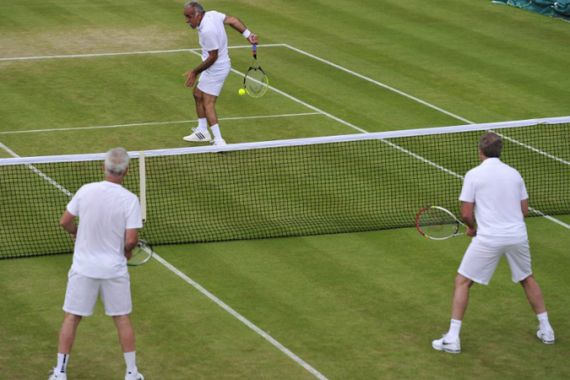Bahrami: Iran’s solo tennis representative
Mansour Bahrami is once again providing the laughs at Wimbledon but his tennis career had plenty of tougher moments.

With the singles and doubles tennis tournaments entering their later stages, proceedings on the main courts are getting rather serious. There is no time for tomfoolery from British hope Andy Murray or world number one Novak Djokovic. Winning is the only aim of the game.
The Invitationals bring back former greats such as John McEnroe, Pat Cash, Lindsey Davenport and Martina Hingis to the grass courts of Wimbledon in an attempt to lighten the mood.
Keep reading
list of 4 itemsWTA Finals to be held in Saudi Arabia from 2024-2026
Djokovic, Ivanisevic split after 12 Grand Slam victories
‘Tragedy’: Tennis star Sabalenka heartbroken over ex-boyfriend’s death
One player born to entertain is Iran’s one and only professional player Mansour Bahrami. Despite losing his opening match to the McEnroe brothers on Wednesday, Bahrami – who has been on the Invitational circuit for about 20 years – shows no sign of tiring of it.
“It’s special to be back here, the atmosphere and crowds are fantastic,” Bahrami told Al Jazeera English.
“We are here to entertain. If you want to be a great champion you have to focus. You can either clown around or win – it’s one or the other. We provide the clowning.”
While Bahrami is enjoying the lighter side of tennis, his early playing days were darker than most.
“My father was a gardener in the biggest sport complex in Iran. When I started walking around, when I was two or three, I saw all the sports grounds. I could play anything except tennis because tennis was reserved for the elite and rich,” Bahrami recalls.
From the age of 3 to 13, Bahrami learned how to play by using metal frying pans, pieces of wood and the palm of his hand. Something that has undoubtedly helped him play the trick shots that delight the Wimbledon crowd.
“When I was 13 the federation needed new players so they gave me two rackets and allowed me to play. Three years later I was on the national team and playing in the Davis Cup.”
However, when the Ayatollah took power in 1980 his career took a big step backwards. The Iranian rulers, suspicious of this capitalist game from the West, banned the sport and closed all courts.
Bahrami stopped playing tennis for three years before emigrating to France. By the time he joined the ATP Tour in 1986 – he had already lost the best years of his career.
Bahrami says this with a heavy heart, although it is likely his need to entertain would have prevented him from reaching the heights of Federer and co.
“Since I was 15 the first thing on my mind was the crowd, to please the crowd. I wanted people to have a good time. There were hundreds of matches I could have won 6-2, 6-3 – but I made them last long and won 7-5 in the third, many I lost.”
‘The only one’
Although Bahrami now lives near Paris and has duel French and Iranian passports, I ask him if it is hard to see such an absence of players from his homeland.
“In Iran – there is no tennis, there is no competition, they don’t do much for sport. You can’t have champions if you are not helped.”
“It is sad. In the late ’70s, that time we were beating many players sometimes Europeans, Asians, then everything stopped – I’m the only one.”
In Iran - there is no tennis, there is no competition, they don’t do much for sport. You can’t have champions if you are not helped
Even now at the grand old age of 57, Mansour Bahrami is the only Iranian player to have played professionally – his peak a second round finish at the French Open and two doubles titles.
“There are Iranian tennis players but they aren’t good enough to be professionals. The UAE are at least spending money on tennis, in Iran they don’t spend money for sport. Sport is secondary.”
“If they are Iranians living in London or Paris it is possible. But in Iran you have no possibilities to practice and become a champion.”
The situation is even more desperate for women who would like to one day play at Wimbledon.
“Women can play in closed areas between them, no men can watch. You will not see an Iranian girl coming through. Aravane Rezaï reached number 15 two years ago but was born in France. If she was born in Iran she would never have become number 15.”
Bahrami certainly managed to bring plenty of smiles to Wimbledon on Wednesday but there is a certain darkness to his own story.
Playing matches with Jimmy Connors, Bjorn Borg and John McEnroe have ensured he is now a tennis star in his own right.
But that never would have happened had he not taken that flight to France.